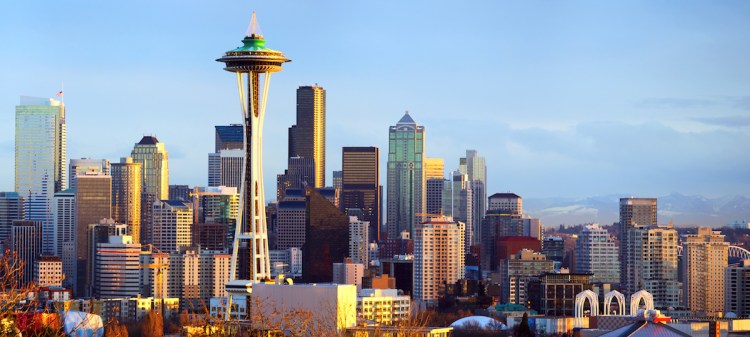Seattle has almost everything other startup communities dream of — two of the largest tech companies by market cap, high-profile family offices eager to invest in tech, and one of the highest concentrations of tech workers in the country. So why does it still punch below its weight in venture capital?
That’s according to a new report on the greater Seattle tech ecosystem. For the past three years, the University Washington of Bothell and Seattle-based advisory firm Iinnovate Leadership Network have measured the progress in Seattle’s tech ecosystem by measuring the number of new startups, funds, and support organizations for entrepreneurs.
This year’s report found that while Seattle raised an enviable amount of venture capital last year — $1.7 billion — it still pales in comparison to cities like Boston and Los Angeles.
“From the outside, it’s like ‘How can you get any healthier than that?” Iinnovate CEO R. Joe Ottinger said to VentureBeat.
June 5th: The AI Audit in NYC
Join us next week in NYC to engage with top executive leaders, delving into strategies for auditing AI models to ensure fairness, optimal performance, and ethical compliance across diverse organizations. Secure your attendance for this exclusive invite-only event.
But he said there’s also a shortage of series A and seed capital in Seattle — which may come as a surprise to other startup ecosystems. Since 2006, Seattle venture capital firms have raised $7.6 billion, while Boston venture capital firms have raised $41.2 billion during that same time period.
In its writeup of the report, GeekWire highlighted BitTitan, a cloud services startup whose $15 million Series A came from San Diego-based TVC Capital — after no Seattle firm would bite. Founder Geeman Yip told GeekWire the chances that it would look in Seattle for its next round of financing were “zero percent.”
The report also found that, unlike in many other startup ecosystems, a significant portion of capital came from outside Seattle in 2017 — “more than half the dollar volume and two-thirds the number of total financing deals,” according to the report.
That doesn’t surprise Matt McIlwain, the managing director of Seattle-based Madrona Venture Group. Madrona invests in seed and early-stage technology companies, with 85 percent of its investments headquartered in the Pacific Northwest. Some of its past investments include Seattle tech successes Apptio and Redfin, which went public in 2016 and 2017, respectively.
McIlwain said that Madrona invested $120 million in startups last year — and its co-investors in those companies doled out another $600 million.
“There’s an increasing number of our friends from other places, such as Silicon Valley, who are interested in joining us in Series A and Series B rounds and then beyond to help build these companies over the long term,” McIlwain told VentureBeat in a phone interview.
McIlwain thinks that the outsized presence of outsized capital is a good thing — many of the investors in Silicon Valley enjoy the startup-building experience that isn’t found as frequently in Seattle. But Otttinger said he’s heard from some Seattle entrepreneurs that when they try to fundraise in Silicon Valley, Menlo Park firms are still most interested in investing in their own backyard, unless the Seattle company is “extraordinary.” Some are also questioned about why Madrona — the most active VC investor in Seattle — might have passed on them.
Ottinger said that the Seattle tech ecosystem needs to think about other ways to encourage the formation of additional capital — potentially through government incentives or by encouraging successful tech executives or entrepreneurs from the Valley to come up to Seattle. Though some high-profile individuals have family offices there — like Vulcan, the investment arm of Paul Allen — there’s just not as great a concentration in Seattle as there is in Silicon Valley.
“You don’t see the same cycle … of investing back [into the community]” Ottinger said.
Seattle’s story offers an important takeaway for other startup ecosystems: Even with the presence of wildly successful tech companies like Microsoft and Amazon, it still takes a high concentration of companies exiting or going public to get a significant number of individuals who are interested in investing in the local startup community.

